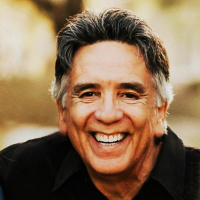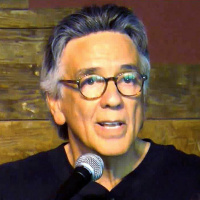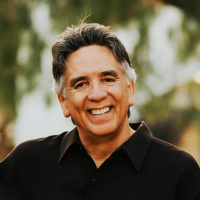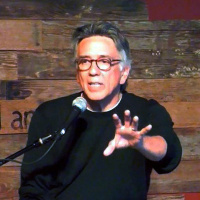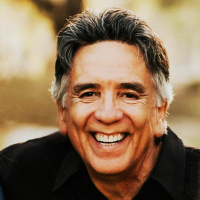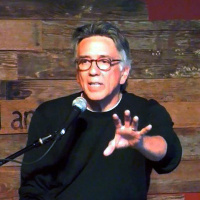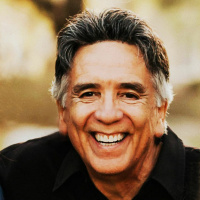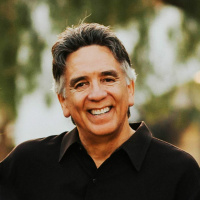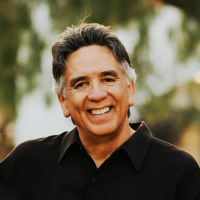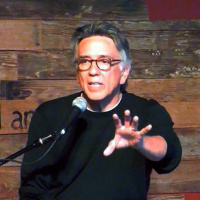David Brisbin Podcast
- Autor: Vários
- Narrador: Vários
- Editora: Podcast
- Duração: 340:11:47
- Mais informações
Informações:
Sinopse
Audio podcasts delivered at theeffect church in San Clemente, CA. theeffect is a community of imperfect people working together to find the emotional recovery and spiritual transformation that is theeffect of Gods love by unlearning limiting perceptions, beliefs, and compulsions, and engaging a first century Jesus in a non-religious and transforming way. See more at theeffect.org.
Episódios
-
Salt And Light
03/09/2023 Duração: 44minThere’s a great story, apparently from Mexico, in which an old mule falls into the farmer’s dry well. Poor animal is braying down there miserably, but the farmer can’t think of a way to get it out. And the mule is old and he’d been meaning to fill in that dry well, so he decides to put the mule out of its misery, bury it, and fill in the well all at once. First shovels full hit the mule, and it’s panic-braying, but after a few more, it goes silent. Farmer looks down to see that with every shovel full of dirt that hits its back, the mule shakes it off and steps up. Shakes it off and steps up, until he simply steps up over the edge of the well itself and trots off. This story is usually used to illustrate how we can face adversity by shaking if off and stepping up. Nail hit on head. But when Jesus says the effect of our taking on God’s attributes as we grow spiritually is to become light in the world, we’re left thinking of straight rays of visible light as opposed to darkness, the absence of light. Or we may
-
Poor And Blessed
27/08/2023 Duração: 54minDave Brisbin 8.27.23 Talking to a man going through a devastating life transition. Now in his sixties, he’d always been a man who could make things happen through sheer intellect and effort: built businesses from the ground up and rose to top leadership in church and ministry. He derived his identity primarily from those two focuses—from ironclad beliefs that were both anchor and compass. But a series of disillusioning events at the church drove a deconstruction of his faith and beliefs that cast him adrift, a down-spiral that included alcohol and a bad fall that incapacitated him long enough to lose his business and nearly his family as well. Four years later, he’s saying he wishes he could go back to the days when life made sense, that he’s not contributing anymore, doesn’t feel value to life. Thinks maybe he should move to a larger city where he’d have opportunities to volunteer, maybe write a book, start a new business. I so resonate with this man. I know that true identity never comes from temporary a
-
Ocean And River
20/08/2023 Duração: 50minDave Brisbin 8.20.23 How do you know you’re in love? Can you explain it, define it? Control it? Oh sure, you can talk about effects on your heartrate and attitude…but define, much less control? You just know. The train leaves the station, and you’re on it. Great movie exchange between atheist and theist: atheist says she will only accept what she can prove scientifically. Theist thinks for a beat, then asks, do you love your father? Yes. Prove it. Jesus gets this. Said such spiritual processes are like the wind. You can’t see it, only hear and see its effects. Can’t know where it’s going or coming from. Powerful, invisible, mysterious. In his usual enigmatic way as poet, Jesus is saying that love and spirit operate outside of logic and rationality. We can’t define or control anything without thinking about it, and if we’re thinking about it, we’re not in it. The only way to fall into the complete loss of self we call love is to stop thinking, fall out of control. To be in love is to be out of control, out o
-
Outside The Box
13/08/2023 Duração: 50minDave Brisbin 8.13.23 Ever heard of the nine dots puzzle? Nine dots arranged in a square, three equal rows of three, like tic tac toe. Challenge is to connect all dots using only four straight lines and without lifting pen off paper or retracing any lines. After snapping a couple of pencils and throwing up your hands, you find the solution looks like an arrowhead with its head on a corner and wings extending beyond the box of dots. We naturally assume the solution must be contained inside the box. There is no solution inside the box. Puzzle imitating life. We naturally assume every challenge we face must be solved inside the box—the scope of our life experience—because we can’t conceive of anything outside our box. You cannot speak of ocean to a well-frog, the creature of a narrower sphere, the philosopher said. As with the frog, the sneakiest part is: we don’t even know we have a box. It’s just life. Our lives. The laws of society, religion, physics, the dynamics of our family of origin, our traumas and tra
-
Saved From Shame
06/08/2023 Duração: 47minDave Brisbin 8.6.23 Thirty-some years ago, I was at retreat with a group that booked the same weekend every year. I’d just go, get a room, and participate in whatever was going on. Or not. This weekend was a large group of older men, and the retreat director, a Chinese-American Franciscan priest, was leading the session. I mention Chinese, not because he was first generation or could write beautiful Chinese script, but because he stood squarely between East and West in his approach to life and faith in a way that changed everything. He was increasingly frustrated with this crusty old group, finally asking why they thought Jesus came to us humans. Hands went up and answers came right out of the Baltimore catechism: he came to die for our sins. The director let out a near wail of a no…clapping his big hands over his shaved head as if to hold it together. What kind of father sends his son to die? He sent him to live, to show us perfect love. He then said something like, if you are going to come here year after
-
Patches And Skins
30/07/2023 Duração: 52minDave Brisbin 7.30.23 Fasting is the body’s natural reaction to loss and longing. Have you ever thought of it that way? When you’re grieving a loss, longing for the return of that loss, you’re probably not thinking about food. Associated with grief and heightened awareness, ritualized for religious purposes, fasting has always been with us. Ancient Jews ritually fasted twice a week personally, four times a year nationally, and to obtain or avoid things longed for or feared. In other words, fasting is not associated with celebration. When Jesus is criticized for not making his followers fast, he replies that they can’t fast as long as the bridegroom is with them. Any Jew hearing that response would instantly know he’s talking about the Jewish wedding tradition, a seven day festival where loss and longing are held at bay for that precious week, celebrating with groom and bride. This little saying gives us a window on Jesus, how he views life—always celebrating, laughing, eating, drinking, experiencing abundance
-
A Hole In The Roof
23/07/2023 Duração: 47minDave Brisbin 7.23.23 Over sixteen years at theeffect, we’ve only had to ask two people to leave a gathering. We want everyone who wants to be with us to be with us, unless they can’t maintain themselves enough to allow others to have their own experiences. Years ago a woman living on the streets would come on Sundays from time to time, usually under the influence. We and the donuts didn’t mind, until one Sunday she was acting so violently, we had to escort her out. But at the end of the gathering as we were all mingling, she came back and made a beeline for me. I stiffened, wondering what was coming—may have actually taken a step back, but gave her direct eye contact, listening while she speed-talked about things I can’t remember. On full alert, I was ready for anything, all sensors tuned to signs of distress, but the more she talked, the more it seemed her difficult moment had passed. Then she stopped, and after a beat said, I guess I just need a hug. Didn’t see that coming, hope I had the presence of mind
-
Breaking Boundaries
16/07/2023 Duração: 47minDave Brisbin 7.16.23 Thirty years ago, three men, Catholic priests, gave me some of their time, became key figures, teachers in my life. I didn’t see it then—it takes time to see trajectories being established, the paths that remain. One of the three I only met once, but I still remember his name and the names on all the book covers he pointed out at the bookstore that afternoon. The other two I knew longer, a period of years. They counseled me and challenged me and then they were gone. I always thought we’d reconnect, but two of them died years ago, and we never did. When the student is ready, the teacher appears. They came into my life exactly when I was ready to receive them, gave me what they had become, and though they left again before I was ready, I still remember their names. The hardest part of being a pastor is watching people go. Letting those who have become friends go their way, sometimes never knowing if you really helped, never hearing the rest of the story. But like teachers and parents, fo
-
Deep Water
09/07/2023 Duração: 46minDave Brisbin 7.9.23 One of the rallying cries of the Protestant Reformation five hundred years ago was “sola scriptura,” which means scripture alone reveals God’s word to humankind. For any Christian who holds the bible in such esteem, what they believe about the book is more predictive of their thought, behavior, and emotion than what they believe about God. If the book is the supreme authority revealing God’s nature and relationship with us, then how we interpret the printed word dictates how we hear God’s word. Unless… The Greek of the New Testament uses two different words we translate as word. The most common one is logos, which signifies the constancy of the written word: the underlying meaning, reason, intent behind it. The other, lesser known and less used, is rhema—the spoken word, a call, the action of uttering a thing said. It is always immediate, present, personal, and spoken now. Plato used rhema as the verb/action that drives the logos, noun/proposition, into being. Rhema is the living voice of
-
Messy Truth
02/07/2023 Duração: 46minDave Brisbin 7.2.23 The recent film Top Gun: Maverick, was hugely successful, with many fans saying, “they don’t make movies like this anymore.” Maverick feels like a throwback to Hollywood’s Golden Age, and it is. It’s depiction of clear heroes and villains, unapologetic respect for country, military, staunch individualism, are all marks of the Modern age that began around the year 1500 and is characterized by reason, science, capitalism, and the morality of individual and human rights. But since the end of WWII, we’ve been living in an increasingly Postmodern world that has questioned and deconstructed Modern values, accounting for most of the left-right culture wars we now face. For all the valid points Postmodernism makes, it’s fatal flaw is that we can’t live life as a negative. We can’t say there’s no meaning here and live that way indefinitely. Humans need meaning, and since the turn of the 21st century, a new movement has been gaining traction that some are calling Metamodern—meta: beyond, transcend—
-
Always Today
25/06/2023 Duração: 50minDave Brisbin 6.25.23 Heard of an elevator speech? You get on an elevator with someone of influence who wants to know what you do. Could you tell them before the doors open again? Thirty seconds to get across mission, vision, meaning, purpose, maybe even a bit of identity. Three or four sentences to be clear, concise, compelling. Obviously, this is a must for sales and marketing, but applies to anything we do with intention or passion. Including our spiritual practice…especially spiritual practice. If we can’t express the crux and intent of our spirituality in one sentence, in one word, it’s likely we’re not experiencing it on a daily basis. Jesus understood this. So did Br. Lawrence, a 17th century French monk who said that his spiritual life was all about presence, that the practice of the presence of God is the spiritual life itself. One word, one sentence…they ordered his life and experience. Jesus said that his Way to the Father was all about love, to seek first the Kingdom of God, and all else would be
-
Our Extravagant Father
18/06/2023 Duração: 53minDave Brisbin 6.18.23 Father’s Day One of the greatest science fiction novels ever, Dune, finally made into a decent movie last year, takes us to a planet that is entirely desert. Sand dunes encircle the globe like an ocean punctuated by islands of scorched rock, the only refuge against the immense sandworms that swim the dunes like leviathan. In such a world, the culture, religion worldview, behavior, discipline of the native people—every detail of daily life, every ritual and concern—revolves around the scarcity of water, their lifesource. As both principle and metaphor, the world of Dune describes us humans on any world at any time. Whatever we experience or perceive as scarce becomes the center of our concern. We wrap our time, attention, effort, religion, culture, hopes, and dreams around it. Whether gold or oil, fame or power, youth, health, wealth, it becomes an object of worship and center of attention. But back on Dune, an outworlder tells a group of natives that where she was born, water fell from
-
Once Sentence
11/06/2023 Duração: 51minDave Brisbin 6.11.23 Can you state your spiritual journey, the whole of your search for meaning, in just one sentence? Br. Lawrence, a 17th century French monk, did just that: The presence of God is what the spiritual life is all about, and by practicing it, one becomes spiritual. Of course he was only channeling Jesus: Seek first the Kingdom, and all else is added. God is unity, oneness; kingdom is being one with God and all God has touched—being present to Presence. Both sentences are one: practice presence, get it all. Jesus loved one sentence, one-liners. Used them to describe what it meant to practice presence: unless we become little children we can’t enter kingdom; unless we exceed the righteousness of the law; unless we are born again, sell everything we own, lose our lives, deny ourselves, we can’t experience that pure connection. All these point at letting go of rational understanding in favor of something indefinable, uncontrollable—spirit experienced like wind, the meaning of spirituality itself
-
Answering The Call
04/06/2023 Duração: 50minDave Brisbin 6.4.23 It can be jarring, offensive to talk about Jesus having to learn and grow in wisdom…even more to think of him working through his own human obsessive-compulsive drives to a place of presence, balance, emotional regulation. Though we were taught, at least implicitly, a fully self-aware Jesus lying in the manger, the gospels tell a very different story. That Jesus was human in every way that we are, had to work through every development we all do. No shortcuts. When the Spirit drives Jesus into the wilderness, he was being called to a hero’s journey, the personal growth cycle always initiated by loss or insight stark enough to devastate our self-narrative, our view of the world as we know it. We don’t have to answer this call—most of us don’t the first dozen or so times. Some never do. To answer the call is to leave our old, too-small world and security behind to face a new world we know nothing of, full of tasks we don’t know how to complete. But if we persevere and complete the cycle, we
-
Graduating Obedience
28/05/2023 Duração: 47minDave Brisbin 5.28.23 Pentecost Jesus heals two blind men with spit, and there’s been endless speculation why Jesus would use such a strange way to heal. Passing a man born blind on the Sabbath, Jesus spits on the ground, kneads the dirt into mud, applies it to the man’s eyes, and tells him to go wash. Why the spit and dirt? To heal with a simple word, would not break the unwritten rules prohibiting work on the Sabbath as taught and enforced by the Pharisees. But kneading the saliva and dirt did. Jesus is going out of his way to put mud in the eye of these rules that had grown exponentially to such a burden on the people as to subvert the intent of the written Law. To imply that God was just about obedience to an inflexible system of ritual justification, obliterated the degreeless love that Jesus represented. Jesus heals the second blind man by spitting directly on his eyes. At first, the man can only see dimly, blurry people walking around like trees. Jesus lays hands on him again, and full sight is resto
-
Saying Yes
21/05/2023 Duração: 45minDave Brisbin 5.21.23 Last week someone asked how I would reimagine church. What would I change? We had just passed our 16th anniversary as a church—I said that’s exactly what we did sixteen years ago. We were a subversive lot back then, wanted to make a big statement about our differences. I was twenty years into study of Jesus from a Hebrew/Aramaic perspective and a personal contemplative journey. Our leadership group had formed around those principles, so we wanted our statement centered on those differences. We didn’t want to call ourselves Christian or church; those terms were loaded, descriptive of a different worldview. We wanted to de-emphasize theology in favor of personal experience in contemplative practice, using theology to limit our error rather than make absolute statements—embrace the uncertainty, paradox of this life. We wanted our gatherings (not services) to be EPIC—experiential, participatory, image-based, communal. We experimented. We started as a recovery church that also worshipped toge
-
Perfect Parent
15/05/2023 Duração: 51minDave Brisbin 5.14.23 Patriarchal and paternal. Two words descending from the Latin word pater/father, but a patriarchal system is one that is male dominated and a paternal system is one where leadership—male or female—restricts the autonomy of people supposedly for their own good. Our country began shamefully patriarchal but not paternal—the states jealously guarded their freedoms. Today we’re much less patriarchal but more and more paternal, losing freedom in the name of the common good. Whether you feel this is appropriate is not so much the point on Mother’s Day as the role women are playing. The assumption has always been that if women were in charge of things, there’d be more balance, and the world wouldn’t be such a mess. But as women take more seats of power, is anything really changing, or does power make men and women look the same? Is matriarchy as toxic as patriarchy and equally paternal? As a model of balance, the perfect parent/government, we certainly should be able to point to God. But is G
-
Tale Of Two Healings
07/05/2023 Duração: 47minDave Brisbin 5.7.23 A man has been ill for thirty-eight years. Ill enough that he’s spent all those years lying by a public pool begging for a living and waiting for a healing. Jesus comes by and asks him if he wishes to be well. After thirty-eight years, that should be insulting. The biggest no-brainer of all time. And yet, the man can’t simply say yes, exclamation point. He complains there is no one to help him get into the pool when the healing waters stir. But that’s not what Jesus asked. What exactly did Jesus ask? In Aramaic, it would be something like tsaveh d’ethelem. Tsaveh is a form of tsevyana, the word we translate as will, but in the sense of desire, delight, pleasure, deepest purpose. Ethelem is complete wellness, wholeness, and health. Paul uses the word to denote sound doctrine, so we could say integrated—sound mind and body—just as shalom (peace) is really the greatest amount of connection, health, prosperity. Jesus’ question is all-encompassing: is your deepest purpose and desire to be whol
-
First Responders
30/04/2023 Duração: 49minDave Brisbin 4.30.23 It’s ironic that Jesus’ primary teaching, the one that defines his ministry and on which he spends nearly all his time, is the one we most misunderstand. Jesus is always talking about entering Kingdom, and of course we’re thinking about entering Heaven. Entering some Place. Or Space. Entering kingdom is a metaphor. A physical image for a spiritual realignment. There is no place or space to kingdom. We don’t enter it. We become it. Pointing at the children Jesus’ friends were shooing away, Jesus instructed to let them through, for such as these are kingdom. The littlest ones, whose egos have not yet formed, are kingdom—have not yet learned not to be kingdom so have no need to re-become it. Kingdom is a shift in identity. Or better, kingdom is the realization of our true identity, the recapturing of who we really are—were at the beginning and still are underneath. The children running at our feet are kingdom because they haven’t yet learned to believe they are not. But it won’t be long be
-
God's Favorite Kid
23/04/2023 Duração: 45minVernon Porter 4.23.23 Vernon Porter takes the pulpit to give us a good look at God's love from another perspective. That we can't outrun God's goodness no matter what happens, however traumatic or how we feel about it. That God's love is always present, and because of the peculiar nature of perfect love, we are all God's favorite kid. Every single one of us.

